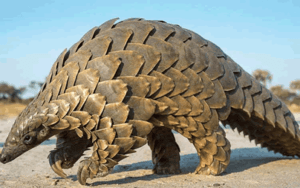On World Pangolin Day – Stakeholders call for protection of endangered species
 Stakeholders in biodiversity and environmental conservation have called on Ghanaians to join hands in the conservation of pangolins, the most trafficked mammal in the world.
Stakeholders in biodiversity and environmental conservation have called on Ghanaians to join hands in the conservation of pangolins, the most trafficked mammal in the world.
The population of pangolins is fast decreasing, thereby falling into the vulnerable to critically endangered category throughout the world due to illicit hunting and poaching in Asia and Africa.
Dr Meyir Ziekah, Manager of Kumasi Zoological Gardens, said there was no data in Ghana on the population of pangolin and that although it was a protected species by the Wildlife Laws, people still hunted and sold them by the roadside.
Speaking at the 2023 World Pangolin Day in Kumasi, he said checks at the bush meat market recently showed that people were selling pangolins against the Wildlife Laws and cautioned perpetrators to desist from the practice.
He urged parliament to hasten the passage of the new wildlife laws to enable the Wildlife Division to punish people who were involved in the pangolin trade.
The programme was organized by the Institute of Nature and Environmental Conservation (INEC), an NGO working to conserve all plants and animals that face critical threats from human activities.
It was themed “Scaling-up Pangolin Conservation in Ghana.”
It targeted students from the Faculty of Renewable Natural Resources of the Kwame Nkrumah University of Science and Technology (KNUST), research institutions and researchers.
“We need to rise up, fight and protect pangolins because they are the most vulnerable species,” he appealed.
Professor Daniel Ofori, Director of Forestry Research Institute of Ghana, said two of the most vulnerable and endangered species of pangolins might go extinct within the next few years.
This, he said, was serious and needed swift actions to save the situation as a nation.
According to the Wildlife Justice Commission, more than 360,000 pangolins were seized between 2016 and 2019.
He said the situation in Ghana had been worse due the lack of data, population, distribution and ecology of the species and it was critical to make decisions on pangolins conservation.
Prof. Ofori called on students to explore how they could incorporate research and studies to come up with data on the species.
Mr David Kwarteng, Executive Director, INEC, said the day was used to raise awareness and conservation profile of pangolins also called for everyone to protect the species.
He said pangolin harvesting had become an international criminal operation which needed to halt for ecological sustainability.
He cited that a recent seizure of about 440kg of pangolin scales in Malaysia, with a street value of $1.2 million which was believed to have been traced from Ghana.
Mr Kwarteng explained that pangolin harvesting was easy and a threat to the existence of the species because one could hunt without a weapon.
“Pangolins play a vital role in their ecosystem as seed disperser and pest control agents. Losing them would have a detrimental effect on the environment and on our own survival,” he observed.
Prof. Emmanuel Danquah, Dean of Faculty Renewable Natural Resources, KNUST, commended the INEC for taking up efforts in conservation of the species.
He pledged that the faculty would work closely with INEC in biodiversity conservation and related fields.
Source: GNA
